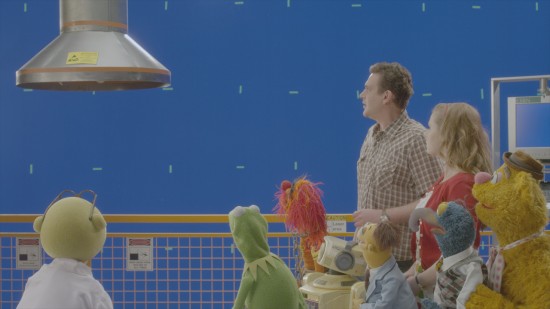On The Visual Effects Artists Protest Outside The Oscars, And The Dire Financial State Of The VFX Industry
On Sunday Ang Lee took the Best Director Oscar for Life of Pi, which also won three other awards, making it the big Oscar winner this year. But what of the more than 400 visual effects employees who spent Sunday protesting business practices that make VFX work a losing proposition for many artists?
The Oscar wins come, ironically, at a very difficult time for one of the companies most directly responsible for the movie's success: Rhythm & Hues, the effects house that filed for Chapter 11 bankruptcy protection just a week ago. Lee didn't mention the company by name in his speech, or thank the artists who brought his film to life.
That bankruptcy highlights a big issue in Hollywood: films are ever-more dependent upon digital effects, but often treats the process of their creation like the work of a sweatshop. (See the Tumblr Before VFX for many examples of familiar scenes without their effects.) Claudio Miranda won the Best Cinematography Oscar for Life of Pi, but much of what we see in the film is the work of CG artists. Many of the film's waves, skies, and animals, including the tiger Richard Parker, are digital. Miranda may have broadly overseen the creation of effects, but he didn't point a camera at some of the film's signature elements.
The men who oversaw creation of those digital elements did get honored, but also took a heavy backhand from the Oscar producers. Just as Life of Pi VFX Supervisor Bill Westenhofer was trying to bring up the trouble Rhythm & Hues faces as part of his award acceptance speech, he was rushed off the Oscar stage with the theme from Jaws. His mic was even cut off. That moment was an ugly metaphor for exactly what the VFX industry is angry about: the people who create the elements big-budget movies rely on for success get no voice, and no respect.
(If you see Facebook and Twitter icons going green this week, that's in support of VFX artists.)
So what's happening in the visual effects segment of the movie industry, and what was the protest about? After the break we'll break down the issues facing effects companies, and explain the reason that imposition of the Jaws theme was so ironically ugly.

Here is a brief outline of the state of the VFX business, condensed in part from one VFX industry employee's account on Reddit:
VFX houses aren't speaking up against studio practices, because any one squeaky wheel can be silenced out of the business. And when effects houses recruit new, young labor, it undermines the effects industry claim that VFX employees are artists who should be treated better for their contribution to any given film. If the segment of the industry that supposedly celebrates these employees doesn't treat them well, who else will have incentive to?
The games industry has faced a version of this problem for a long time. Game designer Tim Schafer elegantly commented a few months ago about the regular practice of building up a game development team over the course of a game's creation, and then laying off most of that workforce once the game is done:
One of the most frustrating things about the games industry is that teams of people come together to make a game, and maybe they struggle and make mistakes along the way, but by the end of the game they've learned a lot – and this is usually when they are disbanded.
How to prevent this in the film industry — in effect, how best to treat individual artists with financial respect, and offer them job security — is one of the biggest issues facing Hollywood today.
 What about unionizing?
What about unionizing?
There have been calls to unionize the VFX industry, which is not a quick or easy process. Could an existing tech union like IATSE (of which, full disclosure, I'm a former member, honorably withdrawn) accept CG artists, or would a new organization be faster? Either one has big hurdles.
IATSE has a deep relationship with studios, and intricate contractual agreements to ensure that members are paid according to very specific rules. Adding a new segment of the industry to the union roll would change the financial landscape of big-budget moviemaking. What happens if studios say that if VFX unionizes, studios have to make one or two fewer films per year, meaning work thins out for everyone? A tricky situation. Even figuring out where to place VFX artists among IATSE's dense hierarchy of existing locals would be a big process.
Creating an all-new organization might be faster, but it would still need the respect of studios and producers. VFX Solidarity International (Facebook and Twitter) is trying to bootstrap an organization effort of some sort. What the results will be remain to be seen.
The VFX industry may indeed need to unionize if it wants real change. There are only a few pressures Hollywood responds to, and large-scale labor forces used to be one of them. (Maybe not even that any longer, however. As Drew McWeeney notes, the last WGA attempt at bargaining up to a better contract didn't really work. Some argue for effects companies to be allowed into profit-sharing, but that seems like an impossibility, given the notorious black magic of studio accounting, and Hollywood's general tight-fisted business practices.
What's the solution? There isn't one at the moment, which is why some companies are facing closure, and others continue to bid on whatever work they can, even if the rates are below what is considered market. Labor in China is going to stay cheap, and will always potentially undercut US companies. Those US companies can do their own outsourcing, and some already do. A flood of recent graduates eager to make their mark in the VFX industry ensures a steady supply of cheap labor.
 It's easy to demonize studios, but studios are only part of the problem.
It's easy to demonize studios, but studios are only part of the problem.
Showing a photo from Life of Pi with the tiger's original stand-in, which looks like a Return of the Jedi prop mockup elegantly makes the point that, without VFX, Ang Lee's Oscar-winning film is a non-starter. Combine that with complaints about studios undercutting prices and the hundreds of people laid off merely from the Rhythm & Hues problems, and people get angry.
Yet this isn't a problem with two participants — studios on one side and effects companies on the other. There are (broadly) three forces: studios, management at effects houses, and the hordes of digital artists trying to make a career in the business.
It's all too easy to say from here, but reading statements from employees paints a stark picture: effects companies need to manage themselves differently. Trained labor needs to be retained, and developed as a resource that isn't easy to replace. If VFX houses keep undercutting their own prices, there is no incentive to change on the studio side (their tactics are working) and no opportunity to grow on the VFX side.
So right now there is an impasse of sorts. We don't know if any change will be big and attention-getting, or gradual. But with the way that movies have developed to incorporate digital artistry in ways most viewers don't even realize, the ultimate resolution will have a lasting effect on the filmmaking business.
Meanwhile, here are Bill Westenhofer, Guillaume Rocheron, Erik-Jan De Boer and Donald R. Elliott speaking to the press backstage at the Oscars, where the speech that got cut off by the Jaws theme has more of a chance to be said:
And for a more specific account of the issue, this is the text of an open letter from a VFX compositor, Phillip Broste, addressed to Ang Lee:
Dear Mr. Lee,When asked about the bankruptcy of Rhythm + Hues, the visual effects house largely responsible for making your film "Life of Pi" as incredible as it was, you said:"I would like it to be cheaper and not a tough business [for VFX vendors]. It's easy for me to say, but it's very tough. It's very hard for them to make money. The research and development is so expensive; that is a big burden for every house. They all have good times and hard times, and in the tough times, some may not [survive]."I just want to point out that while, yes R&D can be expensive and yes it takes a lot of technology and computing power to create films like yours, it is not computer chips and hard drives that are costing you so very much money. It is the artists that are helping you create your film.So when you say "I would like it to be cheaper," as an artist I take that personally. It took hundreds of hours from skilled artists and hard-working coordinators and producers to craft the environments and performances in life of Pi. Not to mention the engineers that wrote all of that proprietary code and build the R+H pipeline. That is where your money went. I'd say, judging from the night you just had, you got one hell of a deal.Incidentally, those were the same gorgeous sunsets and vistas that your DP Claudio Miranda took credit for without so much as a word of thanks to those artists. And the same animated performances that helped win you the best director statue. Nice of you to mention the pool crew, but maybe you could have thanked the guys and gals who turned that pool in to an ocean and put a tiger in to that boat?It was world class work, after all. And after a fabulously insulting and dismissive introduction from the cast of the avengers, at least two of whom spent fully half of their film as a digitally animated character, R+H won for it's work on your very fine piece of cinema. And just as the bankruptcy was about to be acknowledged on a nationally-televised platform, the speech was cut short. By the "Jaws" theme.If this was meant as a joke, we artists are not laughing.Mr. Lee, I do believe that you are a thoughtful and brilliant man. And a gifted filmmaker. But I also believe that you and everyone in your tier of our business is fabulously ignorant to the pain and turmoil you are putting artists through. Our employers scramble to chase illegal film subsidies across the globe at the behest of the film studios. Those same subsidies raise overhead, distort the market, and cause wage stagnation in what are already trying economic times. Your VFX are already cheaper than they should be. It is disheartening to see how blissfully unaware of this fact you truly are.By all accounts, R+H is a fantastic place to work; a truly great group of people who treat their employees with fairness and respect. Much like Zoic Studios, the fabulous company that I am proud to work for. But I am beginning to wonder if these examples of decency will be able to survive in such a hostile environment. Or if the horror stories of unpaid overtime and illegal employment practices will become the norm, all because you and your fellow filmmakers "would like it to be cheaper."I, for one, won't stand for it. Please join me.Warmest regards and congratulations,Phillip BrosteLead Compositor
[Header image via Flickr user bojett]
